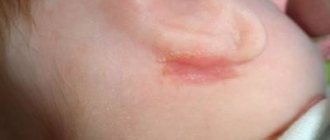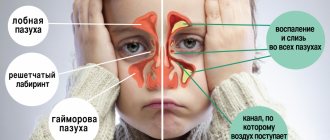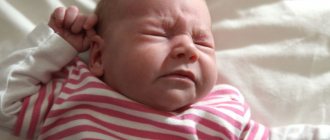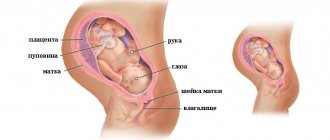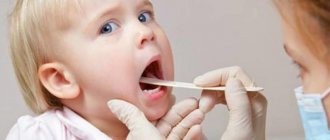Infant grunts his nose
Literally immediately after being discharged from the maternity hospital, a young mother may discover that her baby is sniffing loudly through his nose and making specific sounds. The newborn does not cough, there is no mucus coming from the baby’s nose, there is no purulent discharge, and the body temperature is not elevated. To put it simply, the child grunts through his nose, but there is no snot.
Komarovsky does not consider this phenomenon to be a reason for parental hysteria and excessive excitement. According to a specialist, the baby’s grunting breathing disappears by the 2-3rd month of life. Your baby will sniffle through his nose for up to a year, after which his breathing will return to normal. What is the reason for this unpleasant phenomenon?
Symptoms of pathologies
If you have a runny nose and your body temperature rises, then there is a reason to seek help from a doctor.
Another symptom will be a decrease in the child’s activity and unusual lethargy.
Nausea, vomiting, upset bowel movements, lack of regular sleep, continuous crying, breast refusal also indicate a possible disease.
Mucus from the nose may drain down the back of the throat, collect in the tracheobronchial tree, and then be coughed out, which is similar to a productive cough.
Physiology is to blame
Why does the baby grunt through its nose? Dr. Komarovsky attributes this manifestation to the child’s body’s attempts to adapt to new conditions.
Snot can bother a newborn baby even during teething. Excessive regurgitation after feeding is another physiological factor that provokes grunting breathing. Babies, having eaten their mother's milk (formula), return to their usual position - horizontal. Some of the food ends up in the back of the nasal passages. When air passes through the child's nasopharynx, a specific sound occurs, reminiscent of grunting.
Your child's nose is grunting, but there is no snot. “Is it a runny nose?” - you ask. We are talking about a physiological runny nose. The mucous membrane of a newborn will become irritated in response to dry indoor air, dust, animal hair, and plant pollen. This is a kind of allergic reaction caused by factors in the new environment.
If, exclusively after a night's sleep, your child grunts through his nose, but there is no snot, Komarovsky associates this with an accumulation of snot in the posterior nasal region. The reason for this is the child’s narrow nasal passages, which swell in response to changing environmental conditions. This can happen after turning on the heating in winter.
Pathological conditions
When a child sniffles, but no snot comes out, posterior rhinitis may be the cause. Doctors call it nasopharyngitis or rhinopharyngitis. It seems to parents that a large amount of mucus has accumulated in the nose, but it is impossible to see and blow the nose.
With posterior rhinitis (postnasal drip syndrome), the same inflammatory process occurs as with normal rhinitis. In most cases, it is triggered by a viral infection. A distinctive feature of posterior rhinitis, which gave rise to its name, is the drainage of nasal mucus into the pharynx.
The manifestations are especially typical when the child is in a horizontal position (the mucus does not drain, but accumulates and thickens in the throat). Additional symptoms may include: sore throat, cough and nasal congestion.
A pathological condition in which a child’s nose can squish is vasomotor and atrophic rhinitis. With these diseases, changes occur in the mucous membranes. The child feels itchy in the nose, stuffiness, snores and gurgles.
An allergic runny nose is also accompanied by wheezing and swelling of the nasal passages. Mucus discharge may or may not be present. Often signs of allergies appear in the autumn-spring period.
Another pathological cause of nasal grunting in young children is stridor. Characteristic symptoms include breathing noises, throat grunting, and gurgling sounds. When examined with a laryngoscope, the doctor observes the following picture in the area of the pharyngeal ring:
In this condition, the nasal passages narrow and the nasopharyngeal mucosa softens. There is no snot observed, but the child behaves restlessly, constantly grunting and groaning. The pathology is dangerous because it is a subtype of obstruction (destruction of the mucous membrane). If such signs are detected, it is necessary to examine the child.
Isn't this a pathology?
A newborn baby “grunts” but there is no snot. The reasons for this may also be pathological.
Among the most common:
- Congenital abnormal structure of the nasal septum. Pathology arises during the intrauterine development of the fetus. Correction is made after preliminary consultation with a specialist.
- Swelling of the mucous membrane, which was preceded by injury to the nasal cavity. Parents who carelessly cleaned their child’s nose with cotton swabs and thereby damaged the nasal mucosa may encounter something similar. The result is swelling and grunting breathing.
- Mechanical damage caused by bruise, blow or foreign body entering the nose.
Treatment options
If a child breathes through his mouth, then he definitely needs help. Air intake through the mouth does not provide the brain with oxygen as required. With prolonged absence of nasal breathing, the child becomes nervous, his sleep worsens and his academic performance decreases.
Treatment of nasal snuffing involves a comprehensive approach, which is expected to:
- Thinning of thick nasal mucus;
- Clearing passages of irritants;
- Relieving swelling and normalizing respiratory function;
- Moisturizing the mucous membrane;
- Regeneration of damaged areas.
If no anatomical changes in the form of a deviated nasal septum, polyps, or problems with the structure of the larynx are detected (they are treated according to an individual regimen), the doctor prescribes a number of medications. Most of them will be aimed at moisturizing the mucous membranes and clearing the nasal passages of dried or thickened snot (if any).
Cleansing the nasal passages
To cleanse the nasal cavity, over-the-counter preparations based on sea or ocean water are usually used. In a certain form, they can be used by children from the first days of life. Saline solutions thin thick mucus and wash it away.
If the use of such drugs is not enough, the doctor may prescribe mucolytic drugs, for example, Rinofluimucil. The spray thins mucus accumulations and cleanses the nasal passages.
For diseases such as sinusitis and sinusitis (this is a very rare occurrence in children under 3 years of age), sinus cleansing is carried out by a specialist in a hospital setting. Antiseptic agents are used for the procedure: Chlorhexidine or Miramistin.
For infants and small children, it is advisable to use aspirators: mechanical or electric, to remove thick mucus from the nose. How to carry out the procedures correctly - read here.
Use of medications
To treat a sniffling nose, vasoconstrictors (Snoop, Galazolin, Naphthyzin) are used. They constrict dilated blood vessels and relieve swelling, restoring nasal breathing. Such drugs are not suitable for the treatment of vasomotor and atrophic rhinitis.
If necessary, the doctor prescribes corticosteroids (Avamys, Nasonex), which have an anti-inflammatory and anti-allergenic effect.
To treat adenoiditis, antimicrobial nasal agents and antiseptics are used: Polydexa, Isofra, Sialor. To increase the body's resistance, antiviral immunomodulators are prescribed: Grippferon, Nazoferon, Interferon for inhalation.
You can make your child's breathing easier using products based on eucalyptus and menthol. Preparations with this composition are used only after two years and as prescribed by a doctor: Doctor Mom ointments, Vicks, Golden Star inhalation pencil, inhalations with aromatic oils and Pinosol drops.
Unclear diagnosis - stridor
Stridor is a disease that can be diagnosed by ENT during examination of a newborn child. The literal diagnosis is “breathing noise.” Some babies have softened laryngeal cartilage or narrow nasal passages from birth. In such situations, the child wheezes while breathing and makes specific sounds reminiscent of grunting. As the baby grows, breathing normalizes.
If stridor is diagnosed, there is a need for additional examinations that will help rule out serious illnesses associated with heart disease, problems with the thymus gland, and bronchi. This fact explains the need for additional examination of the child by a doctor at the age of 2-3 years.
Does the baby grunt, sniffle and grunt in his sleep? We tell you why this happens
“Babies do make a lot of sounds,” confirms pediatrician Rachel Ouellette. They can generally be unbearably loud with their gurgling, snoring, whistling, hiccups, coughing, yawning, sneezing and grunting.
Newborns are just learning to breathe in the big world outside their mother’s belly, and therefore this process is accompanied by a variety of sounds - from touching to very strange.
It's completely normal if your baby makes strange noises while sleeping.
However, if any of them seem alarming to you, do not forget to discuss this with your pediatrician.
Breathing unevenly
Ouellette notes that babies breathe through their noses, and their breathing rates can be very different from those of adults. While sleeping, a newborn may take 30–40 breaths per minute, while adults typically take only 12–20 breaths per minute.
Don't be alarmed if you suddenly hear a few quick breaths and then a short pause before your baby starts breathing again - this is completely normal and the vast majority of babies stop doing this by six months.
Snores, whistles and snorts
Even during a quiet infant sleep, you can often hear snoring or whistling. “An intermittent whistle may be due to the baby's narrow nasal passage,” Ouellette explains. “But most often it is associated with boogers.”
Most children are born with a stuffy nose (no wonder - they spent nine whole months in amniotic fluid), and therefore snorting, coughing and sneezing help them get rid of excess mucus in the respiratory tract. Also, infant snoring is often associated with too small nostrils, and goes away as the child grows.
Groaning and pushing
Many babies grunt from time to time in their sleep - this may indicate digestive processes. “Most babies grunt as their digestive system works and they learn to poop, pee and pass gas,” says Ouellette.
Grunting doesn't always indicate constipation: "Even if you hear them pushing, it just means they're trying to figure out which muscles they need to use to get the job done."
Other sounds, such as lip smacking or finger and hand sucking, may indicate that the baby is hungry and will soon wake up crying.
In most cases, if a child is healthy, growing, gaining weight, and developing new skills appropriate for their age, strange sleep behavior should not be a concern for parents.
When should you see a doctor?
Warning signs include: difficulty breathing or excessive breathing, problems with feeding and poor weight gain, and long bouts of crying that cannot be calmed.
Groaning may also be a symptom of health problems if it is heard rhythmically with each baby's breath, if the baby's face and lips appear pale, or if it feels like each breath is difficult for the baby to take. In these cases, you should consult a doctor.
Another problem that may be associated with “musical” children's sleep (even if the doctor has confirmed that all these sounds are completely normal) is poor sleep of the parents. It can be difficult for young parents to fall asleep even in complete silence, and if a baby is constantly creaking, grunting, sniffling and sniffling in their ears, then this risks turning into an impossible task.
There are several options for solving the problem (besides enduring the first, most restless period of the child’s life): for example, you can move the crib a little further from your bed, sleep next to the child in shifts (while the other parent is fully resting in silence) or use “ white noise”, which will help drown out extraneous sounds.
Read more on the topic
Is your baby screaming and demanding attention all the time? This is fine!
How to understand what your baby wants by looking at his face
How to survive a sleepless night with a baby
How to help a baby?
The baby grunts through his nose, but there is no snot. What to do? In the case of physiological reasons, to solve the problem, parents need to eliminate allergens and provide comfortable living conditions for the child, namely an air temperature within 20 degrees and a humidity of 50-70%.
Remove all dust accumulations from the nursery: furniture, carpets, books, etc. Try to keep pets as far away from the child as possible. The same applies to food for aquarium fish, flowers and other potential allergens.
In order to alleviate the baby’s condition, Komarovsky advises using saline solution to moisturize the nasal passages. You need to drip the product every 60 minutes, 3-4 drops. Rinsing with water and sea salt will also help.
Don't forget about regular walks in the fresh air, which help the nasal mucosa stay moisturized and the nasal passages clean. Contraindications to long walks can only be an aggravated form of the disease, provoking high body temperature.
Give your baby plenty of water. This will help establish water-salt metabolism and replenish fluid imbalance in the child’s body. Children older than six months can be given fruit drinks containing vitamin C (cranberry, raspberry, etc.).
Is your baby literally choking on snot? You can get rid of white transparent mucus using a special suction, syringe or regular syringe. During the procedure, you should use a composition to cleanse the nasal passages. They can be found at the pharmacy.
Prolonged secretion of mucus, its abundant accumulation in the nasopharynx, change in the color of snot to yellow or green are clear reasons to seek medical help. A specialist’s opinion is also necessary for any of the mentioned pathological causes of the phenomenon.
Physiological factors
Most newborns grunt due to natural features characteristic of the first months of development. At this time, the nasal passages are so narrow that small noses are just adjusting to normal breathing. This is especially true for children born with a weight below normal: less than 3 kg.
Another feature of the newborn period is the adaptation of the respiratory system. It is caused by the transition from intrauterine oxygen production from the aquatic environment to independent breathing. At this time, the child develops a local immune response, which causes excess mucus to be produced in the nose. The baby may squelch and grunt through the nose due to the so-called physiological runny nose.
Finally, in some newborns, the nasal septum is so mobile and elastic that its involuntary displacement during breathing causes similar disorders. There is no need to worry about this: this is a natural restructuring of a growing organism. When the baby grows up, everything will return to normal on its own.
If grunting sounds accompany a baby's breathing after the second month of life, they are probably caused by the following:
- The characteristic grunting may be a consequence of the accumulation of gases in the tummy. Protrusion of the diaphragm disrupts the breathing process, which manifests itself in such a non-trivial way.
- The nasal passages can become clogged with food debris that remains after regurgitation.
- A long stay in a supine position, in which infants spend most of their lives, can provoke retention of secretions in the nasopharynx. If a newborn grunts every now and then, but no snot is observed, this is a reason to stimulate his activity. Place your baby on his tummy and do massage and water treatments. This will help to establish free breathing and improve his health.
- The baby often grunts and sniffles when the swaddling is too tight. It is worth mentioning that modern pediatricians generally do not recommend swaddling newborns, so as not to hinder physiologically correct development. For overly excitable infants, loose swaddling is acceptable.
- Dry mucus accumulates in the nose or crusts form due to increased blood supply to the nasal canals.
This phenomenon, which is normal for young children, is aggravated by excessive dry air. The optimal humidity in the nursery should be at least 60-70%. The air becomes especially dry in frosty weather. To ensure that the baby can breathe comfortably, when atmospheric humidity increases, doctors recommend installing a special humidifier in the baby’s room.
Medical problems
The remaining 10% of cases of a newborn snorting are associated with specific diseases or developmental defects. To eliminate them, you need to contact a pediatrician or ENT doctor who will carefully examine the baby’s nose. In some cases, the help of a surgeon may be required. Grunting sounds can be caused by:
- Mechanical damage. The slightest injury to the thinnest mucous membrane as a result of careless medical manipulation or illiterate cleaning of the nose leads to swelling, narrowing the nasal passages.
- Entry of a foreign body. Suspicion may arise from sudden congestion that does not go away after instillation of vasoconstrictor drugs. In this case, the newborn may not only grunt and rub his nose, but also cough.
- Deviation of the nasal septum. A natural deformity that is often diagnosed in children. In this situation, chronic nasal congestion is never accompanied by the appearance of snot. For severe curvatures, surgical correction is indicated.
- Infection. A large group of respiratory viruses and bacteria cause a common runny nose, which is easily recognized by the presence of nasal discharge.
- Congenital defects. If serious abnormalities in newborns are detected immediately after birth, minor deformities may remain unrecognized for a long time. These include pathologies of the cartilage tissue of the bronchi, compression of the trachea by the aorta, and malformations of the lungs. One of these birth defects, choanal atresia, is characterized by fusion of the nasal passages. Warning signs include asymmetry of the nasolabial triangle, noisy breathing, and a high palate.
- Allergy. If your baby starts snorting and sneezing at the same time, his eyes turn red or a rash appears, you should think about the presence of any allergens in his environment. Most often, such manifestations result from a reaction to new complementary foods. Discard the foods that were introduced into your baby’s diet and consult an allergist.
WHO studies have confirmed the fact that almost all newborns diagnosed with allergic rhinitis have intestinal dysbiosis. Therefore, along with treating unpleasant symptoms, it is necessary to normalize the intestinal microflora.
- Reaction to temperature change. Some children react with grunting sounds when leaving a warm room into the cold.
First aid
During any manipulations, you need to remember that during the first months the newborn breathes exclusively through the nose. Long-term congestion, which does not threaten the health of an older child, is extremely dangerous for infants. Therefore, signs of difficulty in nasal breathing cannot be ignored.
If your newborn sniffles, grunts, or makes other unusual breathing sounds, first inspect the nasal passages. If you find a foreign body in your nose, do not try to remove it yourself. Call a doctor or ambulance immediately.
Sometimes upon examination dried crusts are visible. To get rid of them, you can clean your baby's nose at home. Cleaning must be done with great care.
- Rinse your nose with saline solution. Pharmaceutical products such as Aquamaris are well suited for this. Place a few drops into each nostril.
- Lay or hold the baby for 10-15 minutes. During this time, the crusts will soften. If your baby reacts to the procedure by crying, pause for a while to calm him down.
- You need to clean the softened mucus with a special suction or a flagellum soaked in saline solution.
Cotton swabs are strictly unacceptable due to the risk of injuring the nasal septum. This is a rather rough instrument for a newborn's delicate nose. However, you shouldn't get carried away with cleaning. If you do this too often, you can achieve the opposite effect: the child will begin to grunt even more. The mucous membrane of the nasal passages will lose its natural moisture and become excessively dry.
If simple nasal cleansing is not effective, your pediatrician may prescribe mucolytic sprays. They thin out dried mucus and help quickly clear the nasal passages.
Eliminating congestion
If congestion is associated with infection, vasoconstrictor drops will help relieve swelling. Do not instill adult nasal medications in your baby under any circumstances: they can cause a burn to the mucous membrane.
For small children, there are special drops with a lower concentration; usually their name has the prefix “for infants” or “baby”.
But even such medications require a doctor’s prescription and strict adherence to the dosage.
When a newborn has difficulty breathing due to a large amount of thick mucus, it can be removed using an aspirator or a special syringe. The procedure will bring relief to the child, because he does not yet know how to blow his nose. Squeeze the bulb of the device, slowly insert the tip into the nostril and gently release it. The contents of the nose will pass into the aspirator.
What not to do when a baby grunts his nose
Almost all traditional medicines that are recommended for the treatment of nose and ARVI, in particular, onion and garlic infusions, as well as breast milk, are banned. Also strictly prohibited:
- Nasal sprays with sea water.
- Warming compresses.
- Homeopathy remedies.
- Essential oils.
Prevention
In order not to worry about why your baby is snorting, it is enough to follow a few simple recommendations. As a rule, this will be enough to forget about the problem forever.
Preventive measures include:
- Daily wet cleaning.
- Maintaining optimal humidity.
- Regular ventilation.
- Stay in the fresh air for at least 4 hours a day.
- Cleaning the nose if necessary, in particular after regurgitation.
- Massage.
- Normalization of intestinal microflora with symptoms of dysbiosis.
- Careful introduction of new products to the menu followed by monitoring the newborn’s reaction.
- Avoiding contact with respiratory allergens (house dust, household chemicals, flowers, low-quality toys and clothing, pets). You should not use perfume in the presence of your baby.
- Preventing accidental contact of a child with particularly small objects that can get stuck in the nose (beads, beads, cereals, etc.)
We wash children's nose correctly
We found out why the child grunts through his nose, but there is no snot. We also learned about ways to alleviate the baby’s condition, among which regular rinsing of the nasal passages is paramount. What about event technique?
To begin, place the child on his side and irrigate the upper nostril with the solution. In the case of newborns, it is better to use isotonic drops rather than sprays. It is also not worth rinsing the nasal passages with saline solution. The salt concentration in it exceeds the salt percentage in the child’s blood by hundredths. This is quite enough to dry out the mucous membrane of a child’s nose.
Then we carry out the same actions with the second nostril. Upon completion of the procedure, the aspirator (syringe) must be cleaned. Komarovsky recommends rinsing the nasal passages every time you have nasal congestion.
Prevention measures
Does your child snort but there is no snot? Komarovsky reassures parents by focusing on the child’s physiology. However, this does not mean that preventive measures should be neglected.
Read more about them below.
- We maintain indoor humidity at 50-70%. We regularly carry out wet cleaning, use a humidifier (cover the radiators with wet towels) during the heating season.
- We maintain the air temperature at 18-20 degrees. We ventilate regularly.
- Getting rid of dust accumulations.
- We often walk with our child in the fresh air.
- We help the baby roll over onto his tummy and hold his head up - this helps normalize breathing.
- We provide regular care for the newborn's nose.
- We bathe the baby regularly.
- We regularly drop physiological solution into the child’s nostrils: 2 drops 2-3 times a day.
